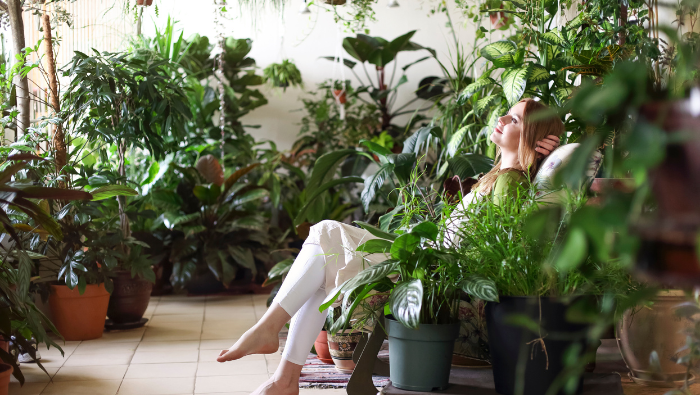Do Plants In Your Bedroom Help You Sleep?
Many people struggle with getting a good night’s sleep, and some turn to natural remedies such as plants.
But do plants in your bedroom actually help you sleep better?
There is evidence to suggest that they might.
Studies have shown that certain plants can improve the air quality in a room by removing pollutants like benzene and formaldehyde.
This cleaner air can lead to better breathing, which may help you sleep more soundly.
Additionally, some plants release oxygen at night, which could also contribute to better respiratory health.
Another way that plants might promote better sleep is through their calming effects.
Many people find the presence of greenery soothing and relaxing, which can help reduce stress and anxiety levels before bedtime.
The act of caring for plants can also be therapeutic and meditative, further promoting relaxation.
I have a bonsai tree that is over 20 years old and still looks great.
I am very lucky to live in an area where the climate allows me to leave it outside year-round, just bringing it in for periodic watering.
It is a little tree that I have had to work hard at keeping alive, but it has been well worth the effort.
I hope to pass it along to my grandchildren someday.
Do Indoor Plants Help With Anxiety?
Indoor plants are becoming increasingly popular in homes and offices.
While they add a touch of nature to our surroundings, can they also help with anxiety?
The answer is yes!
Research shows that indoor plants have a positive impact on mental health and may even reduce stress levels.
Plants release oxygen during photosynthesis, which helps to improve air quality.
This increase in oxygen supply can improve brain function and reduce symptoms of anxiety such as difficulty concentrating, irritability, and fatigue.
In addition, the act of caring for a plant provides a sense of purpose and responsibility that can be therapeutic for those struggling with anxiety.
Another way indoor plants help with anxiety is by providing a calming effect on our senses.
Many indoor plants have been shown to have natural healing properties that promote relaxation and reduce stress levels.
This is especially true when one goes to tend to the indoor plants, as this provides a distraction from daily stressors and can provide a sense of calm.
Indoor plants can even help with anxiety by helping to relieve symptoms related to seasonal affective disorder (SAD).
What Plants Reduce Anxiety?
Anxiety can be a debilitating condition that affects many people across the world.
While there are various treatments available for anxiety, such as medication and therapy, some people prefer natural remedies to help ease their symptoms.
Plants have been used for centuries to treat various ailments, including anxiety.
But which plants are best suited to reduce anxiety?
One plant that has gained popularity in recent years is lavender.
Lavender is known for its calming properties and has been used in aromatherapy to promote relaxation and reduce stress levels.
Studies have shown that inhaling lavender essential oil can help improve mood and reduce anxiety levels.
Additionally, it has been found that simply having lavender plants around can help lower heart rate and blood pressure.
Another plant that may help reduce anxiety is chamomile.
Studies have shown that chamomile tea can reduce anxiety and improve sleep.
It has been found to be particularly effective when used in conjunction with other herbs, such as lavender and hops.
What Bedroom Plants Reduce Stress?
If you’re looking for natural ways to reduce stress, adding some greenery to your bedroom can be a great option.
Not only do plants add visual appeal, but they also have been shown to have a positive impact on mental health.
But with so many options out there, which plants are best suited for reducing stress in the bedroom?
One plant that is known for its calming properties is lavender. Its scent has been proven to lower heart rate and blood pressure, promoting relaxation and better sleep quality.
Another popular bedroom plant is aloe vera which not only purifies the air but also has healing properties that can help soothe anxiety symptoms such as headaches or skin irritation.
Additionally, spider plants are great at removing harmful toxins from the air while simultaneously releasing oxygen and moisture into the room which can increase feelings of tranquility and reduce stress levels.
How Do Plants Improve Mental Health?
Plants are often seen as a way to add some visual appeal to your home, but did you know they can also improve your mental health?
Research has shown that plants have a positive impact on our well-being, including reducing stress and anxiety levels. In fact, incorporating plants into our daily lives can lead to increased productivity and creativity.
One reason why plants are so beneficial for mental health is that they help purify the air. This means that indoor plants can remove toxins from the air, providing a healthier environment for us to breathe in.
Additionally, being around nature has been shown to reduce symptoms of depression and improve overall mood.
Studies have also found that caring for plants can be therapeutic in itself.
Tending to a plant and watching it grow can give us a sense of accomplishment and purpose.
It’s something tangible that we can see growing and thriving, which is a better feeling than the stress and anxiety that accompanies so many modern-day jobs.
So with all of these benefits, it makes sense to incorporate plants into your daily life.
Do Plants Help With Depression?
Depression is a mental condition that affects millions of people worldwide.
It can be caused by various factors, including biological, psychological, and social factors.
While there are several treatments available for depression, many people are looking to alternative therapies to support their recovery journey.
One such alternative therapy gaining popularity is the use of plants.
According to research, certain plants have properties that can help reduce symptoms of depression and anxiety.
Plants such as lavender, chamomile, and rosemary are known for their calming effects on the body and mind.
They contain compounds that stimulate the production of serotonin and dopamine – neurotransmitters that help regulate mood.
Furthermore, studies show that having indoor plants in your living space can improve air quality and reduce stress levels.
This means that incorporating plants into your daily routine could potentially have a positive impact on your mental health overall.
When it comes to the benefits of having indoor plants in your home, there are many.
The most obvious is that they can help improve the aesthetic appeal of your living space.
Plants are not just for decoration, however; they can also be powerful tools for improving the air quality in your home.
Plants that are grown inside absorb carbon dioxide and release oxygen during the day, meaning that they can help improve indoor air quality.
Studies show that having indoor plants in your home can lower stress levels.
Should You Sleep With Plants In Your Bedroom?
If you’re an avid plant lover, you may have considered the idea of sleeping with plants in your bedroom.
While some people swear by the benefits of having plants in their sleeping space, others argue that it may not be the best idea for a good night’s rest.
So, should you sleep with plants in your bedroom? Let’s take a closer look at both sides of the argument.
On one hand, having plants in your bedroom can offer numerous benefits.
Plants are known to purify and improve air quality by absorbing harmful toxins, which can ultimately lead to better respiratory health and deeper breathing during sleep.
Additionally, certain types of plants like lavender and jasmine have been shown to promote relaxation and reduce stress levels – perfect for winding down before bed.
However, some people may find that bringing nature into their bedroom can actually cause allergies or other respiratory issues if they are particularly sensitive to pollen or dust.
For those with allergies, it may be best to avoid bringing houseplants into your bedroom.
Conclusion
In conclusion, plants can offer a natural and effective way to improve mental health and well-being.
They have been found to improve air quality, reduce stress and anxiety levels, and promote better sleep quality.
Specific plants such as lavender, chamomile, and aloe vera have been shown to be particularly effective at reducing symptoms of anxiety and depression.
Incorporating plants into your daily life can offer therapeutic benefits, including providing a sense of accomplishment and purpose.
Therefore, adding some greenery to your home or office can be a simple and effective way to improve your overall mental health and well-being.
You may also enjoy…
How Does Lemon Balm Tea Work For Anxiety?
Can Exposure to Other People’s Sweat Help Reduce Social Anxiety?






![Funny Ways To Save Money [Insider Secrets] Funny Ways To Save Money, Funny Money Saving Tips Memes, Unusual Ways To Save Money, Funny Money Hacks, Money Saving Jokes, Ways To Save Money Fast, Funny Money Tips, Save Money Live Better, Fun Easy Ways To Save Money, Fun Ways To Save Cash](https://mentalhealthsage.com/wp-content/uploads/2022/10/Funny-Ways-To-Save-Money-Funny-Money-Saving-Tips-Memes-Unusual-Ways-To-Save-Money-Funny-Money-Hacks-Money-Saving-Jokes-1-150x150.jpg)
![How To Deal With Rejection At Work [Or, While Job Searching] How To Deal With Rejection At Work, What Are The 5 Stages Of Rejection, How Long Does It Take To Recover From Rejection, How Many Job Rejections Is Normal, Crying After Job Rejection, Dealing With Job Rejection Depression, Rejection For A Job I Was Perfect For, How To Stay Positive After Job Rejection, Dealing With Job Rejection Reddit, Tired Of Job Rejection, Can You Get Hired After Being Rejected, How To Respond To Rejection, What Does Too Much Rejection Do To A Person, How Long Does The Pain Of Rejection Last](https://mentalhealthsage.com/wp-content/uploads/2022/10/How-To-Deal-With-Rejection-At-Work-What-Are-The-5-Stages-Of-Rejection-How-Long-Does-It-Take-To-Recover-From-Rejection-How-Many-Job-Rejections-Is-Normal-150x150.jpg)
